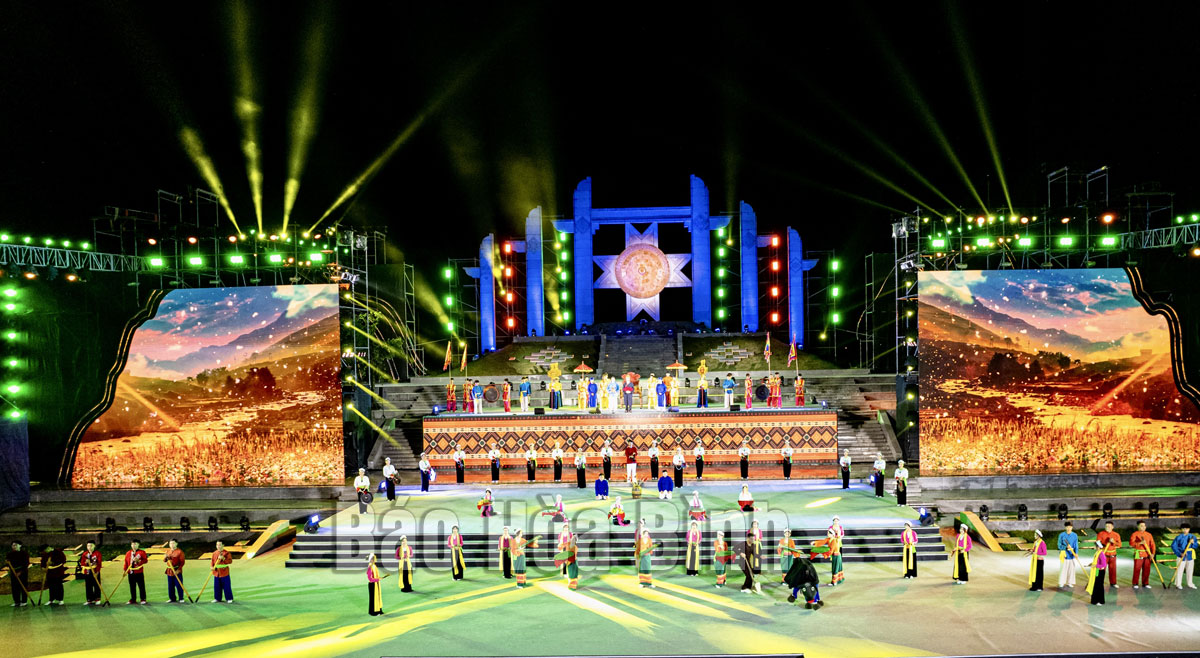
(HBO) - Through many ups and downs of history, Khai ha (going down to the field) festival has been preserved by the Muong ethnic group in Hoa Binh province, becoming their indispensable cultural and religious activity every spring. joining the festival, locals wish for a peaceful and prosperous life.

Khai ha festival was promoted at a special art programme in 2022 when the province received certificates recognising bamboo calendar and the festival as national intangible heritage.
Talking about the cultural value of the Khai ha festival, Luu Huy Linh, Deputy Director of the provincial Department of Culture, Sports and Tourism, said that the heritage reflects, preserves and disseminates the cultural values of the Muong ethnic group, and demonstrates admiration and veneration of the god who set up the Muong land. The festival also aims to strengthening community cohesion, and is a spiritual and cultural activity reminding younger generations of the tradition of the ethnic group.
Today, Khai ha is one of the most pervasive festivals that have a great influence on the spiritual life of the Muong ethnic group. In 2022, with many efforts of the province, this festival was recognised as national intangible cultural heritage.
The festival, also dubbed as the ploughing or forest opening festival, has connection with the wet rice cultivation which carries a sign of civilisation of the ancient Vietnamese. Khai ha in each Muong region takes place at different times and places./.
With an increasingly vibrant and widespread emulation movement aimed at building cultured residential areas and cultured families, Yen Thuy District has been making steady progress toward improving both the material and spiritual well-being of its people, while fostering a civilized, prosperous, beautiful, and progressive community.
Once lacking recreational spaces and community facilities, Residential Group 2 in Quynh Lam Ward (Hoa Binh City) has recently received attention for the construction of a new, spacious, and fully equipped cultural house. The project followed the model of state support combined with public contributions in both labor and funding.
The "All people unite to build cultural life" movement, which has been effectively integrated with Kim Boi district’s socio-economic development goals, is fostering a lively spirit of emulation across local residential areas, hamlets, villages, public agencies, and enterprises. In addition, through the initiative, traditional cultural values are being preserved and promoted, while community solidarity and mutual support in poverty reduction and economic development are being strengthened.
A working delegation of the Hoa Binh provincial People’s Committee led by its Permanent Vice Chairman Nguyen Van Toan on June 11 inspected the progress of a project to build the Mo Muong Cultural Heritage Conservation Space linked to tourism services in Hop Phong commune, Cao Phong district.
Born and growing in the heroic land of Muong Dong, Dinh Thi Kieu Dung, a resident in Bo town of Kim Boi district, in her childhood was nurtured by the sweet lullabies of her grandmother and mother. These melodies deeply imprinted on her soul, becoming an inseparable part of her love for her ethnic group's culture. For over 20 years, this love for her hometown has driven Dung to research, collect, and pass down the cultural values of the Muong people to future generations.
In the final days of May, the Ethnic Art Troupe of Hoa Binh Province organized performances to serve the people in remote, mountainous, and particularly disadvantaged areas within the province. These were not just ordinary artistic shows, but they were the meaningful journeys aimed at spreading cultural values, enhancing the spiritual life of the people and contributing to the preservation of ethnic minority cultural identities.



